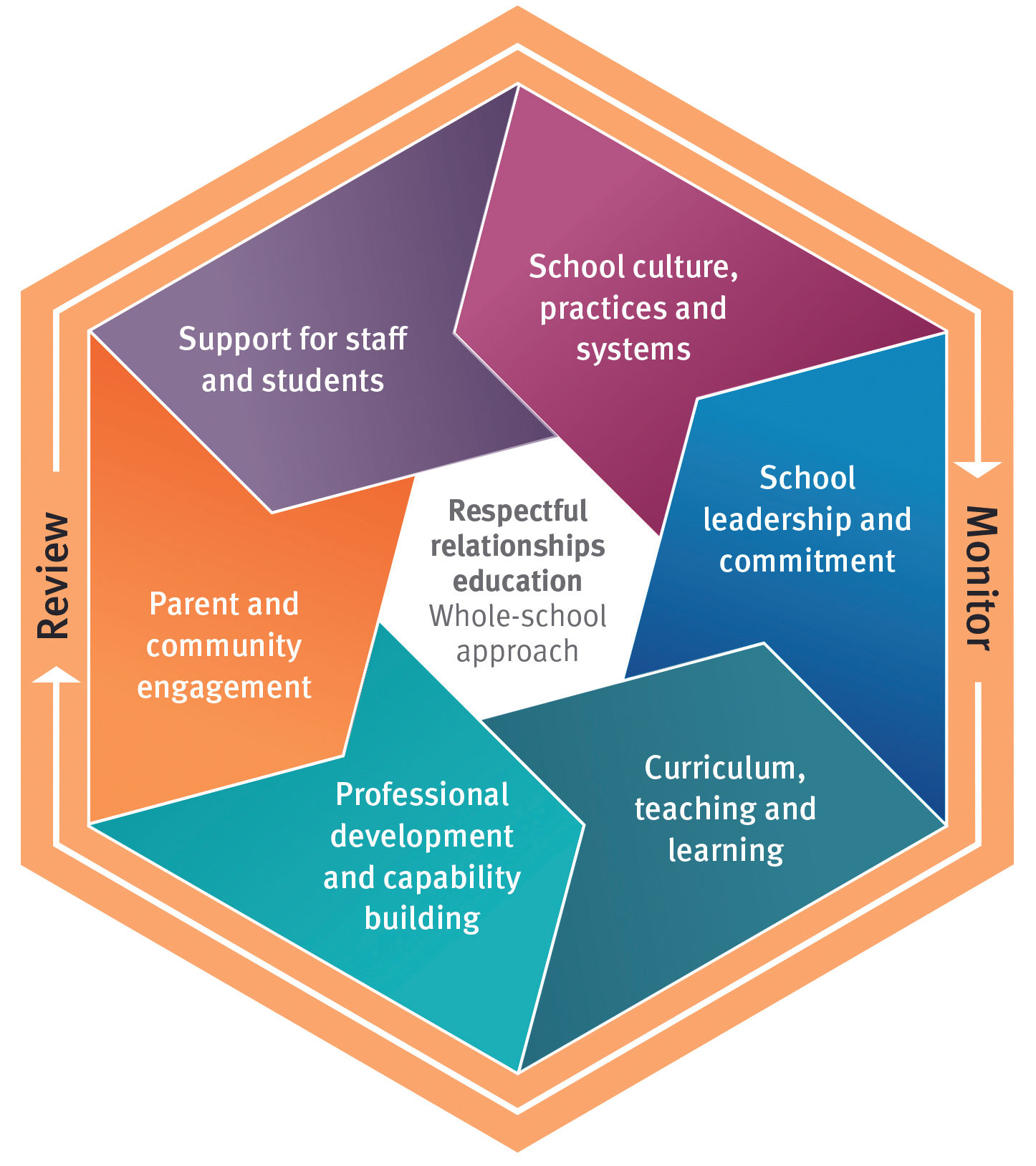ACHPER: What should quality Respectful Relationships Education include?
ACHPER is the acronym for the Australian Council for Health, Physical Education and Recreation Incorporated, a professional member-based organisation which has been advocating for health and physical education, personal development, sport and recreation for 70 years. Supporting active and healthy lifestyles across the lifespan is part of our core business, along with supporting schools and teachers of HPE, PE, PDHPE, sport and recreation in their professional work.

One of the privileges that ACHPER has is to have members, staff, and board members involved in the creation and delivery of curriculum in every state and territory. We are in a unique position to synthesise and suggest a range of curriculum, pedagogy and assessment possibilities for teachers from the range of best practices around the country.
In this article, we explore the drivers and features of quality approaches to Respectful Relationships Education (RRE) from the evidence base and various jurisdictional documents (i.e., from international organisations and education departments). These texts are derived from international research and national and state contexts, distributed in the form of policies, which are “recontextualised” into national and state-based curricula for teachers to bring to life in classroom experiences and assessment opportunities for their students.
What are some international and national policy “drivers” of RRE?
Policy can be understood as both intention texts and action, that is, international and national documents calling for action and targets to be met (what is intended), and the actions taken to achieve them (what is enacted, and how it is reported).. Such documents provide overarching aims, aspirational targets, how they will know they’ve been met, and by whom. A policy driver for RRE is the World Health Organisation’s (WHO) comprehensive sexuality education (CSE) policy. The CSE policy argues that such programs should be:
Such international guidance is underpinned by dozens of intersecting policies such as the Sustainable Development Goals (SDGs), Human Rights, including eliminating violence against women, and Economic, Social and Cultural rights, such as the right to sexual and reproductive health.⁵,⁶
Some national policy drivers of RRE in Australia include the Australian Government’s Consent and Respectful Relationships Education (CRRE) measure which supports the wellbeing of primary and secondary school students. The national policy is shaped by an expert working group and seeks youth voice on the topic, such as through the Human Rights Commission’s study underway into “Keeping our children and Young People Safe.”
This means there is a genealogy of RRE policy, which looks something like what is depicted in Figure 1 below. The evidence, ideas and philosophies that are distributed through policies make their way into state level documents.

There are often “sideways” policy influences, from other government departments, such as Health, Indigenous, Communities, or Multicultural Affairs, and externally funded organisations such as “Our Watch,” churches, and the independent schooling sector.
The state, geographic location, and context of your school, taking account of the community in which it is located, are also important policy influences. For example, in Western Australia, the Department of Communities is the lead organisation in delivering the Respectful Relationships program, with support from the Department of Education.
Defining features of Respectful Relationships Policies
As Figure 1 illustrates below, all state RRE policies are shaped to various extents by international and national policies. We do not have the space to unpack every state, so this article will focus on the Queensland Department of Education and Training’s version to illustrate potential features of RRE.
The Queensland example shows clear alignment with the WHO policy of “health promoting schools” (2021), taking a whole school approach to RRE (that is, wider strategic planning, communication, professional learning and partnerships, as well as curriculum).⁷
As shown in Figure 2, what is actually taught in the curriculum is just one of six interrelated and equally important components to delivering RRE, nested within a monitoring and review cycle. Actions to develop and sustain parent and community engagement in schooling are required by the federal and all state departments of education, with generic professional learning provided by organisations such as the Australian Institute for Teaching and School Leadership (AITSL).

AITSL similarly supports the development of school leadership practices but not specifically in relation to RRE. If you are wondering if your school has “got it right” with engaging parents in the delivery of RRE, there are a number of helpful research articles, for example, an Australian literature review of health education in faith-based schools, a case study of two primary schools with differing levels of parental involvement, and a case study of health education curriculum development, including RRE, in an Indigenous community.⁸,⁹,¹⁰
How ACHPER can help you deliver quality RRE
ACHPER’s work is guided by the Australian Health Promoting Schools Committee, who have developed a comprehensive, free audit tool to map your current offerings against national principles of health education.
Once you have completed your audit, any gaps in your whole-of-school approach will be identified and ready for innovation. ACHPER currently leads health education professional learning for all teachers, not only HPE teachers, around Australia through various, state and territory-specific workshops (see www.achper/org/au), but we also work one-on one with schools to customise your approach to your needs, your community, and your students.
In terms of Figure 2, we have you covered for professional development and capability building, and co-designing quality RRE curriculum and learning and teaching approaches. For example, as experts in the Spectrum of Teaching Styles in Physical Education, we know that a combination of learning and teaching approaches, including reciprocal, inclusion, and guided discovery, work best to bring children and young people along in the learning in RRE.
As can be seen with the 2024 publication dates for many state policies, Australian education departments are taking their responsibility seriously to innovate and support quality RRE in schools.
As can be seen with the 2024 publication dates for many state policies, Australian education departments are taking their responsibility seriously to innovate and support quality RRE in schools. interested in delivering the best possible experience of RRE to students, your job is to work out who to work with, and how, to make your program as best as it can be. ACHPER is here to support you every step of the way.
Written by, Associate Professor Sue Whatman, FACHPER ACHPER Australia President.
References
1. Whatman, S., Thompson, R., and Main, K. (2019). The recontextualisation of youth wellbeing in Australian schools. Health Education, 119(5/6), 321-340.
2. Whatman, S., and Dinan Thompson, M. (2019). Health and Physical Education. In D. Pendergast, & K. Main. Teaching Primary Years, Routledge.
3. Ball, S. (1993). What is policy? Texts, Trajectories and Toolboxes. Discourse: Studies in the Cultural Politics of Education, 13(2), 10-17. DOI:10.1080/0159630930130203
4. World Health Organization (WHO) (2018). International technical guidance on sexuality education: An evidence-informed approach. UNESCO.
5. United Nations. (2018). Your Health, Your Choice, Your Rights: International and Regional Obligations on Sexual and Reproductive Health Rights. OHCHRFactsheetYourHealth.pdf
6. Department of Education and Training, Queensland. (2024). A whole-school approach to respectful relationships education. Queensland Government. https://education.qld.gov.au/parents/communityengagement/Documents/whole-school-approachrre-fact-sheet
7. Ayling, D., Whatman, S., Williams, B., & Main, K. (2024). Health education in Christian faith-based primary schools: a scoping study. Curriculum Studies in Health and Physical Education, 15(3), 375-392.
8. Keddie, A., & Ollis, D. (2020). Context matters: the take up of Respectful Relationships Education in two primary schools. Australian Education Researcher, 48, 211-225.
9. Whatman, S., & Singh, P. (2015). Constructing health and physical education curriculum for Indigenous girls in a remote Australian community. Physical Education and Sport Pedagogy, 20(2), 215-230.
10. Our Watch. (2024). Respectful relationships education. https://www.ourwatch.org.au/education
11. Australian Council for Health, Physical Education and Recreation (ACHPER). (n.d.). Australian Health Promoting Schools Committee. ACHPER.
12. World Health Organization (WHO) (2021). Making Every School a Health-Promoting School.
0409 899 490

